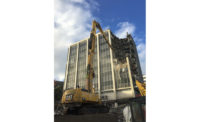
Turkish government agencies say the damage is widespread and severe from the 7.2 earthquake that rocked eastern Turkey on October 23.
The quake destroyed 2,262 buildings, killing 366 people and injuring 1,301, according to AFAD, Turkey’s Disaster and Emergency Management agency.
Kockopru Dam, a 75-meter-high, clay core rock fill dam and hydro-electric powerplant on the Zilan River in the Lake Van Basin, withstood the earthquake with no damage. So did the other dams in the area, according to the State Hydraulic Works (DSI).
Also unharmed was the recently restored Armenian Akdamar Church located on a rocky island in Lake Van.
Ercis, a town of 75,000 near the Iranian border, the city of Van and the surrounding villages were the hardest hit. Buildings in Bitlis, approximately 100 km for the epicenter, also sustained serious damage.
Eighty multistory buildings, mostly residential, are reported to have collapsed in Ercis. According to the Dept. of Earthquake Engineering at Bogazici University in Istanbul, about one out of four structures in the town are reinforced concrete and six out of ten unreinforced masonry. One out of 10 are adobe and rubble stone.
The worst damage was inflicted on three-to-seven-story high buildings constructed in the last 30 years with cast-in-place concrete frames, hollow brick infill panels and unconnected partition walls.
Turkey has a long history of deadly quakes, including a massive 1999 earthquake that struck the densely populated and industrialized Marmara Sea region near Istanbul in the middle of the night. That quake killed around 17,000 people.
In the past, concrete structure have performed poorly in Turkish quakes, chiefly from a lack of lateral resistance in the framing systems, irregularities in strength, poor quality construction materials and inadequate reinforcement detailing and confinement in beam-column joints.
None of 10 ready-mix factories in the region meet quality standards, according to THBB, the nation's ready-mix concrete association.


Post a comment to this article
Report Abusive Comment